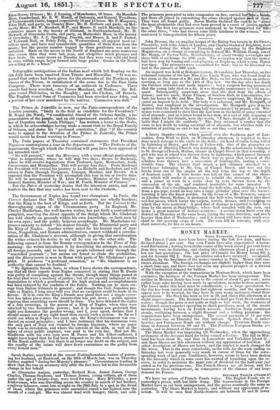Sarah Barber, convicted at the recent Nottinghamshire Assizes of poison-
ing her husband, at Eastwood, on the 20th of March last, was on Thursday further respitcd "during her Majesty's pleasure." Circumstances tending to show that she was an accessory only after the fact have led to this favourable change in her behalf.
At Gloucester Assizes, yesterday, Richard Rear, James James, George Charles, Thomas Stephens, and Thomas James, young colliers, all of them under the age of twenty-four, were tried for rape. Mary M'Carthy, a poor Irishwoman, who was travelling across the country in search of her brother, a-railway labourer, came late at night on the 29th July to a spot in the forest 'of Dean, where the prisoners wero assembled round a fire lighted near the mouth of a coal-pit. She was almost dead with hunger, thirst, and cold.
John Broome, the ex-pugilist keeper of the Rising Sun tavern in Air Street, Piccadilly, with John James of London, and Charles Staden of Brighton, were examinee during the whole of Thursday and yesterday by the Brighton Magistrates, on a charge of conspiring to defraud Mr. William Hamp, son of Mr. Hamp, of Paden Villa, Herefordshire, of about twenty sovereigns and three bills of exchange for 100/. each. The accusation was that the money had been won by tossing and card-playing, at Brighton, while young Hemp was tipsy. The prisoners were committed for trial; but to be liberated on bail to the amount of 3001. each.
An inquest was held at Bishopsteignton, Devonshire, last Thursday, on the exhumed remains of the late Miss Jane Emily Wyse, who was found dead in her room at the house of a Mr. and Mrs. Hele, on her return from an archery meeting, as long ago as the 14th of May last. On the day after her death the Coroner attended and made inquiries ; but a surgeon having prononced that the young lady died in a fit, it was thought unnecessary to hold an in- quest. Subsequently suspicions arose that she died from the effects of poison; and her uncle, Major Ellison, of Boulton Hall, in Lincolnshire, for- bade his house to Mr. and Mrs. Hele. To remove suspicions, Mr. Hale pro- cured an inquest to be held. The body was exhumed, and Mr. Herapath, of Bristol, was employed in the investigation. Mr. Herapath gave it as his opinion that the death of the young lady was occasioned by prussic acid. Wit- nesses were examined to show that she had been in the habit of using essential oil of almonds ; and in a letter found in her desk, in a sort of will, disposing of some trifles for her friends, were the words, "I have thought it not impro- bable that I might die suddenly." The Jury returned a verdict that she came to her death by taking essential oil of almonds, but whether with the intention of putting an end to her life or not they could not say.
A heavy thunder-storm, which passed over the Southern part of Lan- cashire, from West to East, on Wednesday afternoon, is reported to have done much damage to the cattle in the fields ; six head of cattle being killed by lightning at Disley, and three at Failsworth. One of the pinnacles on the tower of Blackley Church was destroyed. In the school-room belonging to St. George's Church, Hulme, situate in Chapel Street in that township, a girl who was at school was thrown down by lightning, which passed through by the open windows ; and the shock was so great that several of the scholars were thrown into a succession of fainting-fits, lasting a consi- derable time. The electric fluid struck a tall chimney attached to a brewhouse belonging to Mr. Cox, of Chapel Street, and tore out the bricks from one of the angles all the way from the top to the depth of fourteen yards. A wide fissure was left at this corner of the chim- ney, which will render it necessary to rebuild the structure. Mr. Cox and a joiner at work in a stable close by were thrown down by the concussion of the air, and rendered insensible for some minutes. It entered Mr. Cox's dwellinghouse, fused the bell-wire, and, striking a branch from a gas-pipe, found its way into a large globular glass over the burner, bursting it into the finest powder. In the house of a Mr. Bowman, surgeon in Chester Street, Hulme, it destroyed the bell-wire, breaking it into short red-hot pieces, which burnt the carpets, towels, dresses, and every on which they were scattered. A good deal of damage is reported to h&c been done by the storm at Stalybridge; where hail mingled with the rain, end broke a great number of factory-windows. A second storm burst over the district on Thursday at the same hour, taking the same direction, and much heavier than that of Wednesday; and it is feared will have done much mis- chief to the growing crops of corn. The rain fell in torrents, with only short intervals, for five or six hours. '
The prisoners pretended to take compassion on her, carried het Into a house, and there all joined in committing the crime charged against itich of them. They were all found guilty. Baron Martin declared the casftp be "about the most abominable that had ever been proved in a court of justiss men." The first two prisoners were sentenced to be transported fof the other three, "who had shown some little kindness to the woman," were sentenced to transportation for fifteen years.


























 Previous page
Previous page